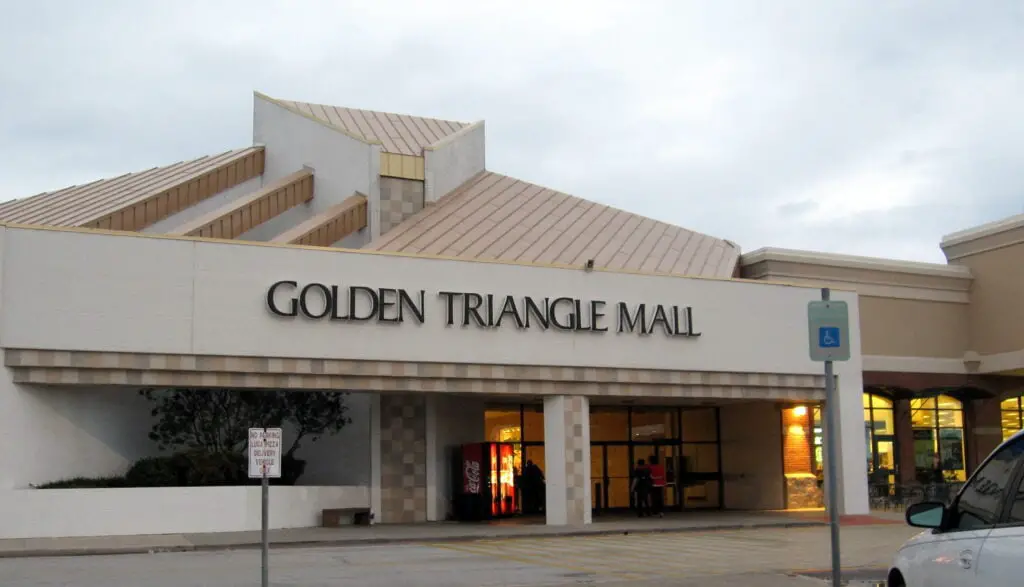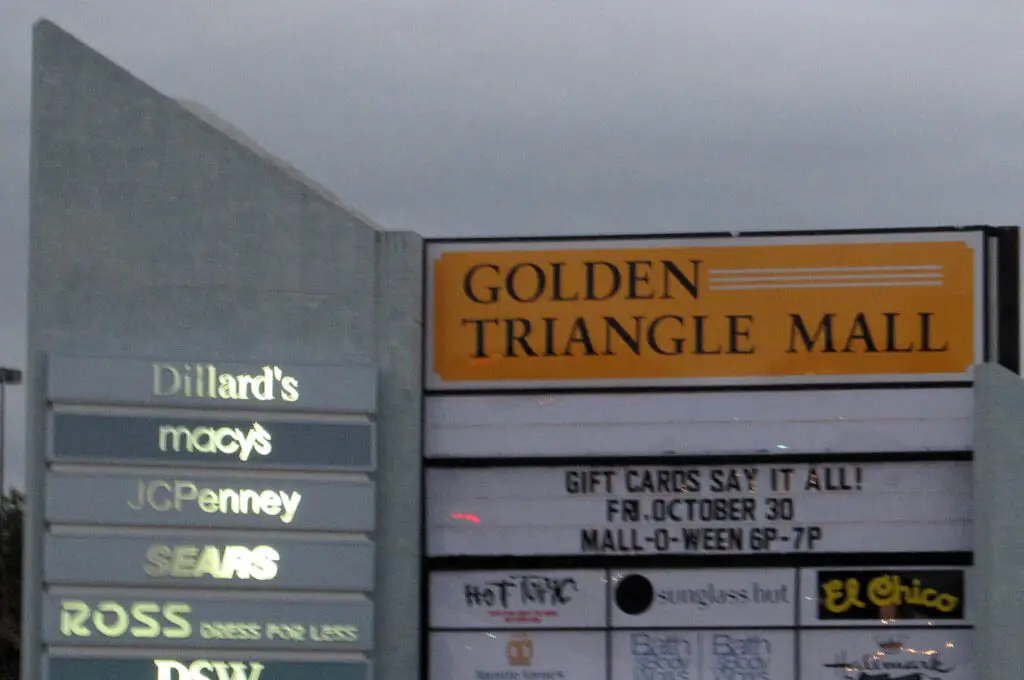Early Beginnings and Construction
Golden Triangle Mall opened on September 9, 1980, marking the debut of Denton County's first enclosed shopping mall. Located at the intersection of Loop 288 and I-35E in Denton, Texas, the mall quickly became a central retail destination.
The original anchors included Sears, JCPenney, Dillard's, H.J. Wilson, Montgomery Ward, McClurkans, and Bealls.
At its inception, Golden Triangle Mall featured a single-level layout with a total leasable floor area of 764,000 sq ft.
The surrounding area included the United Artists Golden Triangle 4 movie theater, which provided additional entertainment options across the street from the mall.
In the early 1980s, Denton Mall Co. managed the mall's construction and initial operation, aiming to capitalize on the growing retail market in the region.
The mall's strategic location and diverse anchor lineup attracted a steady flow of shoppers, establishing it as a bustling hub for commerce and social activities.
By positioning itself at a key intersection and offering a wide array of stores, Golden Triangle Mall catered to the needs of the local community and the nearby college population.
The mall's early years were characterized by rapid growth and success, laying the foundation for its role as a prominent retail center in Denton.
For those exploring things to do in Denton, Texas, Golden Triangle Mall quickly became a must-visit destination.
Growth and Competition
Golden Triangle Mall enjoyed great success in the 1980s. The place was bustling, with shoppers and retailers thriving. However, this period faced a new challenge in 1989.
The opening of Music City Mall (The Vista) in Lewisville brought new competition just south of I-35E. Vista Ridge, being much larger, started drawing away customers, impacting Golden Triangle's foot traffic.
Denton's economic landscape also played a role. Denton, known for its colleges like the University of North Texas and Texas Woman's University, had a fluctuating economy.
College towns often face lower income levels, affecting local businesses, including malls. Retailers at the Golden Triangle felt the pinch as students and residents had limited spending power.
Despite these challenges, the Golden Triangle remained resilient. Anchors like Sears, Dillard's, and JCPenney continued to draw shoppers.
The mall's management tried to innovate and adapt to the changing market. They introduced promotions and events to keep the community engaged and maintain a steady flow of visitors.
Even though competition and economic factors posed challenges, Golden Triangle Mall retained its role as a central shopping hub in Denton.
The mall's strategic location and diverse retail offerings ensured that it stayed relevant to the local community.

Ownership Changes and Renovations
In 1999, Simon Property Group acquired Golden Triangle Mall from Denton Mall Co. They saw potential in the property and aimed to revitalize it.
By 2000, the mall underwent a $3.5 million renovation. This facelift included new floor tiles, updated entrances, enhanced restroom facilities, and modernized mall graphics.
These changes aimed to improve the shopping experience and attract more visitors.
Feldman Mall Properties bought the mall in 2006 for $40 million. They planned extensive renovations, budgeting over $30 million. Their vision included more modern retail spaces and upgraded amenities.
However, Feldman Mall Properties encountered financial difficulties. Proposed renovations were halted due to the company's economic instability and potential sale.
By June 2010, JPMorgan Chase & Co. announced intentions to sell the mall at a foreclosure auction to recover $25 million owed by Feldman Mall Properties.
This situation underscored the mall's financial struggles during that period.
On September 1, 2010, Cencor Realty Services and The Weitzman Group assumed management and leasing. Their involvement brought a fresh perspective and management style to the mall.
Financial Struggles and Management Shifts
The new management had to navigate a challenging retail environment. They focused on improving the mall's appeal and attracting more visitors. Between 2012 and 2014, Golden Triangle Mall underwent extensive renovations.
The mall added new stores like Buckle, Charlotte Russe, and Body Central, which aimed to diversify the retail mix and draw a wider audience.
In March 2015, H&M announced plans to open a 23,000-square-foot store. This new anchor was a strategic move to attract more fashion-conscious shoppers.
The store opened near the west entrance patio and fountain area, adding exterior signage and access.
Through these years, the mall's management worked hard to stabilize and improve the property.
They focused on creating a welcoming environment and a modern shopping experience. This period of change aimed to ensure the mall's long-term viability.

Store Openings and Closures
In May 2018, Sears announced it would close as part of a plan to shut down 72 stores nationwide. Sears closed its doors on September 2, 2018, leaving a large vacant space.
In August 2019, DSW decided not to renew its lease. Fitness Connection took over the space, opening in April 2020. This new addition brought a different type of business to the mall, focusing on fitness and wellness.
In January 2020, Conn's Home Plus leased 45,000 square feet of the former Sears space. Originally scheduled to open in April, the store's opening was delayed until July due to the COVID-19 pandemic.
January 2021 brought more changes. Macy's announced it would close as part of a plan to shut down 46 stores nationwide. Macy's closed its doors permanently on March 21, 2021.
These changes reflected broader trends in the retail industry, where many traditional department stores faced challenges.
Despite these closures, Golden Triangle Mall continued to adapt. The introduction of new stores and businesses showed the mall's resilience and ability to evolve.
The mall's management focused on maintaining a diverse mix of tenants to attract a broad range of shoppers. This approach aimed to keep the mall relevant in a rapidly changing retail landscape.
Anchor History and Changes
Golden Triangle Mall's anchor stores have changed many times over the years. The original anchors included Sears, Dillard's, JCPenney, Montgomery Ward, H.J. Wilson, McClurkans, and Bealls.
These stores provided a solid foundation for the mall's early success. Montgomery Ward became Foley's in 2001 and later Macy's in 2006. Macy's remained a key anchor until its closure on March 21, 2021.
H.J. Wilson's space evolved. In April 2020, it became Service Merchandise, then DSW, and finally Fitness Connection.
Bealls' location transitioned to Ross Dress for Less. These changes reflect how the mall adapted to new retail trends and consumer preferences.
Golden Triangle's ability to attract new retailers, like H&M in 2015, and reconfigure existing spaces shows its resilience.
The constant evolution of its anchor stores highlights the mall's efforts to stay current in the competitive retail landscape.
Recent Developments at Golden Triangle Mall
Golden Triangle Mall in Denton, TX, continues to adapt and evolve amidst the changing retail landscape.
In July 2024, Windsor Fashions LLC announced the grand opening of a new women's clothing store within the mall.
This addition aims to attract a younger, fashion-forward demographic, adding to the mall's diverse retail mix.
On May 31, 2023, the contract with Fanboys Marketplace at the mall was terminated. The store had to vacate the premises, highlighting ongoing issues with tenant stability.
This incident underscores the broader trend of mall tenants facing economic difficulties.
The economic environment and shifting consumer behaviors have placed pressure on traditional shopping centers.
Nationwide, malls are struggling, and Golden Triangle Mall is no exception. As retailers reassess their brick-and-mortar strategies, the potential for further store closures looms.
Despite these challenges, Golden Triangle Mall management remains committed to revitalizing the shopping experience.
The recent renovations and the introduction of new stores aim to keep the mall relevant and appealing to shoppers.
The future of the mall depends on its ability to adapt to the evolving retail environment and maintain a compelling mix of stores and services.
